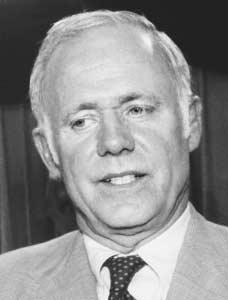James Burke
1925–
Former chief executive officer, Johnson & Johnson
Nationality: American.
Born: February 28, 1925, in Rutland, Vermont.
Education: Holy Cross College, BS, 1947; Harvard Business School, MBA, 1949.
Family: Son of a salesman and a homemaker (names unknown); married; children: two.
Career: Procter & Gamble, toilet goods division, 1950–1953; Johnson & Johnson, 1953–1966, product director; 1966–1970, president; 1970–1971, chairman; 1976–1989, CEO.
Awards: Presidential Medal of Freedom, 2000; named one of the "Ten Greatest CEOs of All Time," Fortune , 2002.
■ James Burke led the health-care giant Johnson & Johnson for 13 years. During the Tylenol cyanide scare in the early 1980s, Burke's forthrightness and quick action cost the company millions but ultimately saved its reputation and preserved customer faith in the Tylenol brand. Industry analysts consider his response a model for corporate ethics and responsibility. Under Burke's lead Johnson & Johnson grew to be one of the world's leading manufacturers of consumer health-care products.
THE EARLY YEARS
Burke grew up in Rutland, Vermont. He learned much about intellectual discourse from his father, a salesman, who always encouraged debate among his four children. After completing Harvard's MBA program Burke spent a few years at Procter & Gamble before joining Johnson & Johnson in 1953. He quit after just one year, however, because he found the environment and lack of innovation stifling. When he left, Burke suggested that the company needed a new-products division. Three weeks later he was hired back as the new department's head.

Burke focused his attention on developing new products. In the early 1950s he tried to market several new cold-care products for children, but they flopped, and he was summoned to the office of CEO Robert Wood Johnson. "I was full of bravado. I thought I was going to get fired," he recalled to Fortune (December 26, 1994). Instead, Johnson said, "I want to congratulate you. Business is about taking risk. Keep doing it."
Burke rose through the ranks of the company. In the 1960s he made the company's first forays into television advertising. He also began marketing Tylenol, which had previously been available only to doctors and hospitals, to consumers. From 1976 to 1989 Burke was Johnson & Johnson's chairman and CEO. He turned the company into a $9 billion empire with some 150 subsidiaries. He also made Johnson & Johnson one of the most employee-friendly and well-respected companies in the country.
FACING A CRISIS
In 1982 Burke faced a corporate crisis of monumental proportions. Someone had tainted bottles of Johnson & Johnson's pain reliever Tylenol with cyanide. The cyanide-laced Tylenol killed seven people in the Chicago area. Rather than trying to cover up the story, Burke quickly put out the word across the media, even appearing on several television programs. He warned the public to avoid all Tylenol products until the company had more information about the tampering.
Johnson & Johnson quickly recalled some 31 million bottles of Tylenol—about $100 million worth of product. Within six weeks Burke had devised a plan to put tamper-proof packaging on all Tylenol products. When tainted Tylenol resurfaced a few years later, Burke decided to do away with capsules entirely. Despite the fact that his decision cost the company as much as $150 million, Burke said at a press conference, "we owe it to customers" ( Time , March 3, 1986). His bold move restored customer confidence. Just one year later Tylenol had regained 90 percent of its market share. The crisis over, Burke was able to turn his attention back to developing new products, such as the antiwrinkle cream Retin-A and disposable contact lenses.
LEADERSHIP STYLE
Never one to fill his staff with employees who were afraid to state their minds, Burke enjoyed having different viewpoints on board. "My style is to encourage controversy and encourage people to say what they think," he told Fortune (October 24, 1988). He always wanted his employees to fight for what they believed in, without fear of repercussions. During his career Burke was also on the board of IBM. He headed up the search for that company's chairman and CEO, placing in the top spot in 1993.
After more than thirty-six years with Johnson & Johnson, Burke retired from the company in the spring of 1989. He quickly found another passion—tackling the nation's growing drug problem. He became chairman, and later chairman emeritus, of the Partnership for a Drug-Free America. For his work with the organization Burke was awarded the Presidential Medal of Freedom, the nation's highest civilian honor. He also became chairman of the Business Enterprise Trust, an association committed to fostering corporate ethics.
See also entries on Johnson & Johnson and Procter & Gamble Company in International Directory of Company Histories .
sources for further information
Ettorre, Barbara, "James Burke: The Fine Art of Leadership," Management Review , October 1996, p. 13.
Koepp, Stephen, "Economy & Business: A Hard Decision to Swallow," Time , March 3, 1986, p. 59.
Labich, Kenneth, "The Seven Keys to Business Leadership," Fortune , October 24, 1988, p. 58.
O'Reilly, Brian, "Managing: J&J Is on a Roll. The World's Largest Health Care Company Says It Puts Profits Last. So Why Are Its Earnings among the Best in the Industry?" Fortune , December 26, 1994, p. 178.
—Stephanie Watson
Comment about this article, ask questions, or add new information about this topic: